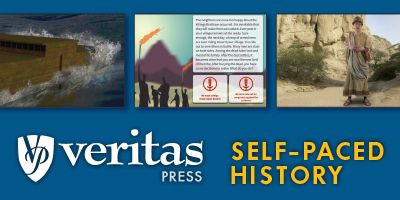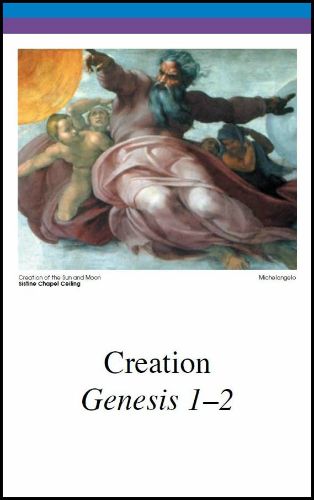I'm not going to do that this time.
As a Crew Leader for the Schoolhouse Review Crew, I knew Veritas Press was going to excite lots of people. Personally I was intrigued, but we already have history, and their Self-Paced History program just isn't something we needed right now, or so I thought. My response to sample videos was not terribly positive. A sphinx in sunglasses (OT and Egypt), very long songs (all of them), adults bickering about who gets to label what on a map (NT, Greece, and Rome), and so on.
To jump ahead in this story, Richard (10) and Trina (8) ended up asking if they could try out Veritas Press Self-Paced History: Old Testament and Ancient Egypt, because they wanted to start at the beginning. One of my job responsibilities is to be familiar with the programs we are reviewing, so we frequently will take a little break from our regularly scheduled programming and spend a week or so checking out something different.

My kids totally loved it. They convinced me that we needed to keep going, therefore we are. And once we received the Old Testament & Ancient Egypt Flashcards, they were completely hooked.
How does this program work?
The Self-Paced History classes are online. Each course is broken up into 32 events, and you have a flashcard to go with each event. Each event is taught over one week, with a lesson for each day. The lesson involves sitting down to watch an online presentation, which includes a few key things:
- Some kind of (usually amusing) presentation of the basic event for the week, and then some additional side events or deeper looks at the event.
- Reading the timeline card (and it is nice to have a real copy for yourself)
- The song, which goes through either all 32 or the first 16 events for the year. And yes, my kids had the first sixteen memorized by about lesson 8, and they have since memorized the whole thing.
- A variety of game-like reviews, both of the current week's event and of past events.
- Map work, including having the kids label the places on the map (drag and drop place names into the blanks).
- A quiz at the end of the week.
 The Flashcards include some additional resource suggestions, such as Usborne and Kingfisher encyclopedias, and Streams of Civilization. I assumed we'd use these, but I've found the video presentations do such a thorough job that I haven't seen the need. Speaking of the flashcards, they are gorgeous, with artwork representing the event on the front. I love anything that incorporates art.
The Flashcards include some additional resource suggestions, such as Usborne and Kingfisher encyclopedias, and Streams of Civilization. I assumed we'd use these, but I've found the video presentations do such a thorough job that I haven't seen the need. Speaking of the flashcards, they are gorgeous, with artwork representing the event on the front. I love anything that incorporates art.There are also reading assignments within the course, for books like Golden Goblet or Tut's Mummy, Lost and Found. We are using most of those.
What it covers:
I had looked at the Veritas Press catalog years ago, and it seemed like a solid program. They work through history mostly chronologically, something I really like. It's not totally chronological. The last event you study in the first course, on Ancient Egypt, "Egypt Falls to Roman Rule," clearly happens sometime later than the first events in the next year's course (Self-Paced History: New Testament, Greece and Rome). In fact, the first event in the Greece and Rome course is about the Minoan Civilization (2200-1450 BC), so for these two levels, there is a lot of overlap.
Their take on chronology meshes with mine. Study what you are learning about in order, but don't spend so much time jumping from one civilization to another that you lose sight of the big picture. Overall, I really am liking what I see. You study:
- Old Testament and Ancient Egypt: this is pretty heavy on the Bible (19 events, up through King Solomon), with major periods in Egyptian history covered from the Unification of Upper and Lower Egypt to the Fall to Rome.
- New Testament, Ancient Greece and Ancient Rome: This course actually covers part of the Old Testament (four events) and the Gospels (four events) and the remaining 24 events primarily relate to Greece and Rome and the early Church.
- Middle Ages, Renaissance and Reformation: This course starts with the conversion of Augustine in 386, so it just barely overlaps with the second one. It covers church history along with events like the Hundred Year War, and ends with John Knox in 1560.
- Explorers to 1815: Of course, this starts with Prince Henry the Navigator (1394-1460), so again, there is a bit of overlap of dates. The last event is the Missouri Compromise of 1820. This is pretty heavy on US history, but I'm guessing that much of what was going on in the world is covered in the course alongside the "main" events.
- 1815 to Present: This starts with the Monroe Doctrine (1823) and ends with "Modern America" which talks about a few events, including 9/11. Again, almost every one of the key events involves the US, though clearly many involve multiple nations.
What I like:
There are a number of things I love about this program.
- Interactive nature means my kids really don't have the chance to zone out.
- The silliness is just right for my 8 year old, the 10 year old sometimes rolls his eyes a bit (but he laughs at it still!) and my 13 year old even makes a point of being in the room when the lesson is playing so that he "happens" to hear it too. He insists he is too old for it, but funny thing is, he always shows up. And, to be totally honest, now that I'm seeing it in context, I find the silly stuff to be fun too.
- The additional reading suggestions are available on a downloadable pdf, so you have plenty of warning to get a book reserved at the library or to find it in your stash.
- There are a couple of hands-on projects, with a pdf warning you about those too.
- I can be very hands-off for this (with a couple exceptions, below) or at the very least, I don't have to do much planning aside from occasionally putting a book on hold at the library. I need some coursework that works that way. I need my little ones to be able to do something independently.
 | ||
| This was one of the hands-on projects -- making pyramids from paper. | They had to add it to a tray of sand! |
Some things I do not like:
- The timing on a few of the activities is HARD. I don't know if it is a less-than-stellar internet connection on my end, or something with the program, but a couple of the games involve things like answering the questions before the earth floods (obviously, for reviewing The Flood), and I have to come over and read the questions and answers and click fast... and we still usually end up losing. We get a second chance, so that time, I will skip reading the questions that were answered correctly the first time, and still be clicking as fast as possible to beat it.
- Spelling. My kids are all pretty horrific spellers, so your mileage may vary. But there are (timed) spelling activities where they have seen a word like "covenant" in one of the discussion slides, and then on the next slide, they need to spell it correctly. That's another one where I end up being called over to help out. A little more time would make me happier with this.
In conclusion:
We are loving this, and are seriously considering sticking with the Veritas Press Self-Paced History for the next couple of years. This course is intended for 2nd through 6th grade, and it is thorough and easy for mom.
Richard (rising 5th grader) had this to say. (I'm trying to spell and punctuate it like I heard it!)
I've really learned a lot from Old Testament and Ancient Egypt. Well, not the Bible part really, as I already knew most of that stuff. But Ancient Egypt? Oh, definitely! I'm learning there. At first, I thought the Sphinx was pretty silly, but now he's actually fun. I think he kinda grew on me. I hate the spelling though. I know I need to learn to spell better, but do I have to do that in history class?
The song is amazing. The first time I listened, I thought they were completely, totally insane to think I could learn all those events, but I was able to sing along pretty quickly, and now I don't even need the music and I can do the whole thing. Other than Simeon and the Sphinx and, ummm, Mrs. Simeon being a little silly sometimes, I really like that they don't talk to me like I'm just a dumb little kid. I mean, they think I can learn all those songs and dates and they were right! I didn't even think I could do that. Oh! I did learn something about the Bible. I never knew that Sarah's name was Sarai before. Though probably someone told me that and I just wasn't listening. This is my favorite history ever. Practically perfect, if they'd just make the spelling go away. I hope we keep going.At $199 per course, (plus $19.95 for the flashcards) it is something I will have to plan for. This course is outstanding though, so I am very likely to do so.
If you are interested in reading what other Crew Members thought of the Self-Paced courses from Veritas Press (all of the history courses, plus Omnibus I), click the banner below:


2 comments:
Thanks so much for sharing this, Debra! I found it very helpful!
Tina (from DesperateHomeschoolers.com)
Hi, I was just wondering if you had your kids do it together or separately? Also, where did you find the info on the projects? So far my boys are working on it together but they haven't mentioned any projects?
Post a Comment